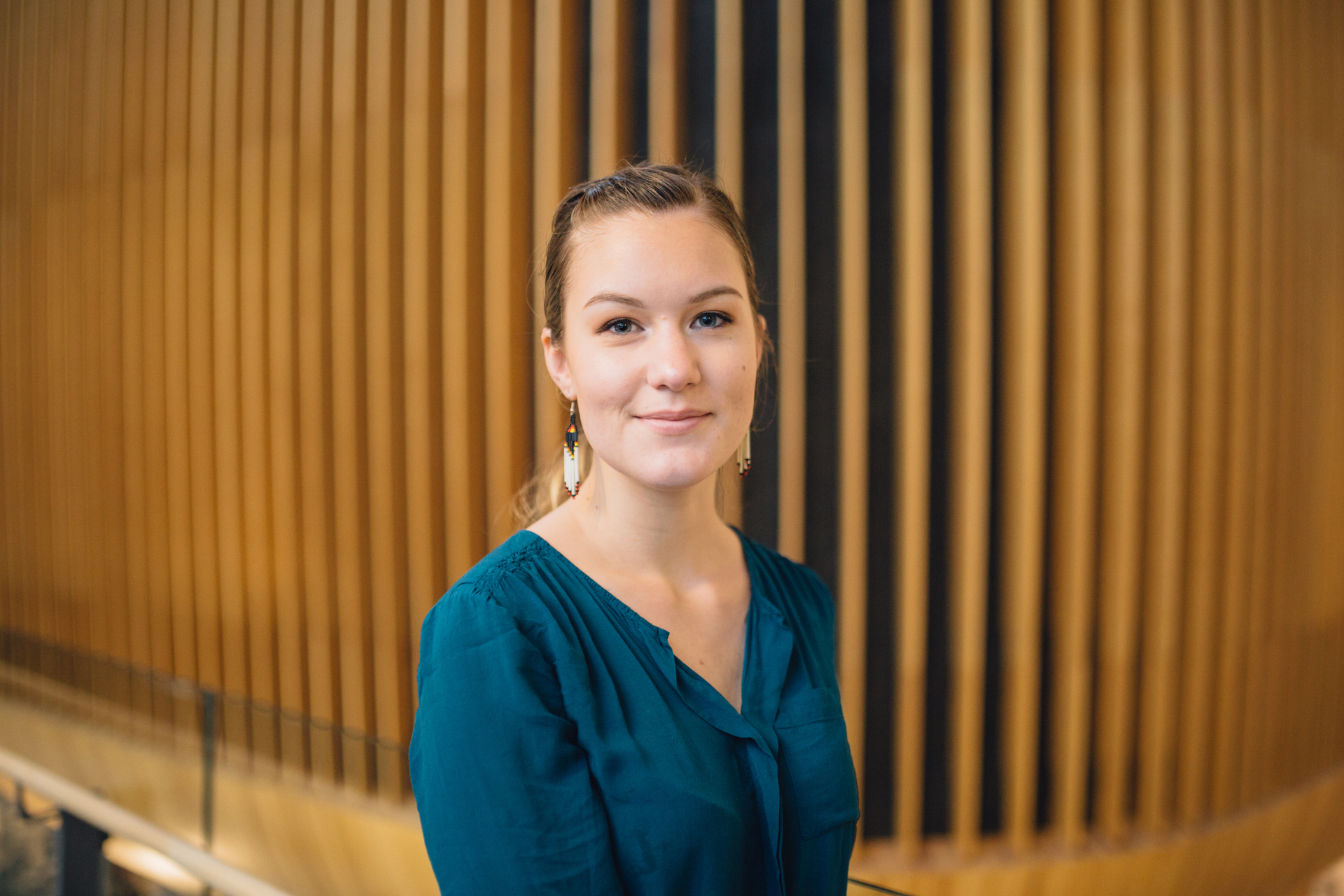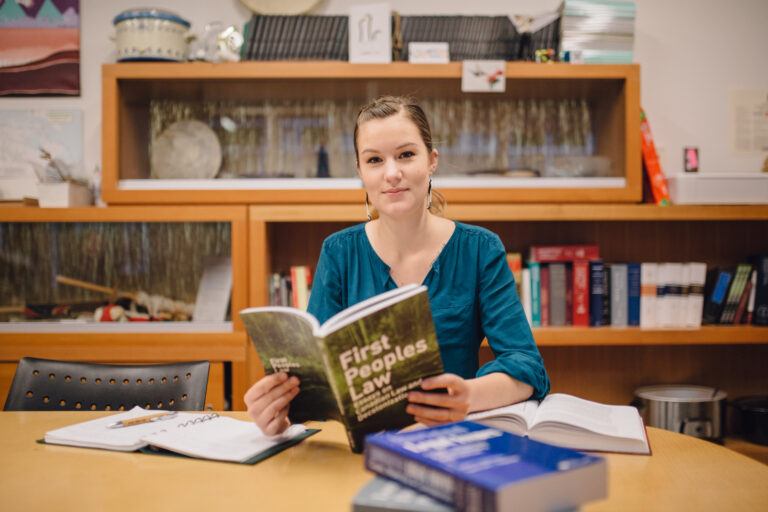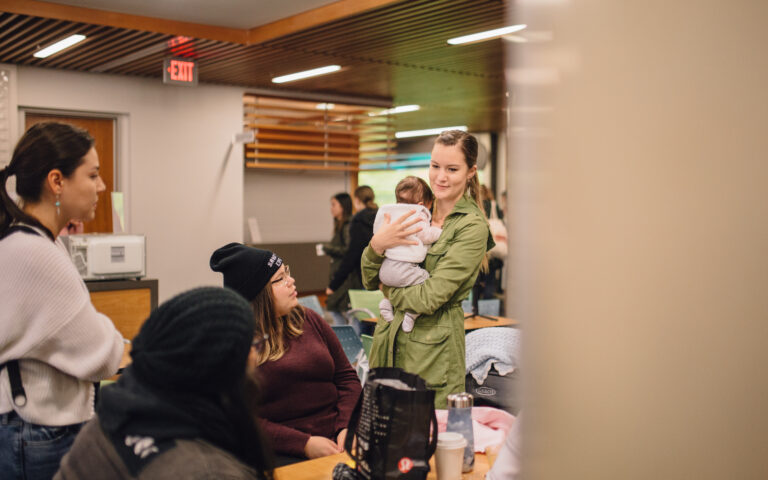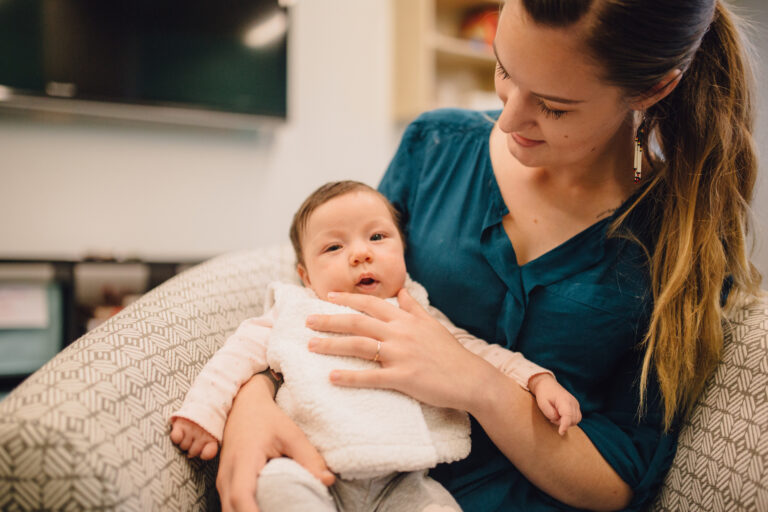Before Verukah Poirier aged out of foster care at 19, she was worried about supporting herself after becoming a legal adult.
Verukah achieved a trades certificate in hairdressing while in high school, but dreamed of following a more academic path. She began her undergraduate studies at Langara College before arriving at UBC as a transfer student, where, as a youth from care, she didn’t have to pay tuition fees. Now in the fourth year of her degree, she has excelled in her classes, built a strong network of lifelong friends, and is proud to call UBC home.
Can you talk about your experiences growing up in care?
My family and I are Cree and Métis from Alberta and Saskatchewan, but I grew up in Williams Lake in British Columbia, away from my family’s reserve. My primary caretaker was my Kôhkom (grandmother), but I did spend a large portion of my childhood in foster care, in a group home or on a youth agreement away from my family and my hometown. I aged out of the child welfare system at the age of 19 in the city of Surrey.
Did you always aspire to go to university?
Absolutely. University was a huge dream of mine – one I didn’t know was achievable. I’ve always loved learning and felt most comfortable in a classroom. Growing up in care often brought a lot of instability, but no matter where I lived, I could always rely on school.
Why did you choose to come to UBC, and what was your journey here?
I decided to come to UBC because I had heard about their Social Work program, and I thought it would be the perfect fit for me. At the time, UBC was one of the only universities in Vancouver that had its own personal tuition waiver program for youth in care, so it made the decision easier. However, because I left high school for a year to pursue a trades certificate, I was a little behind on the entrance requirements for UBC. So I started my post-secondary education at Langara College, and transferred to UBC in my third year through the UBC-Langara Aboriginal Transfer Partnership.
How did you choose your campus and program?
I visited UBC Vancouver once to meet with an enrolment services advisor, and I fell in love with the beauty of the campus. I knew instantly that this is where I wanted to be every day. I decided to major in First Nations and Indigenous studies because I thought it would make for a smooth transition into Social Work. However, I found my passion in Indigenous Law, and decided to minor in Law and Society rather than continue into Social Work. I’m planning on starting at the Peter A. Allard School of Law at UBC in September next year.
I have definitely received more support than I could imagine at UBC.
How did you find the transition to UBC?
In one word: overwhelming. But with the support of many peers and faculty at UBC, I managed to overcome my anxiety and start to make sincere connections on campus. Personally, I find it difficult to make and maintain strong relationships due to my time in care. However, I can say that the community at UBC made it easy for me build a great network of lifetime friends. I can honestly say that I have found the family I always wanted at UBC.
At UBC – as well as other post-secondary institutions in the province – individuals who have grown up in care don’t have to pay tuition fees. Did you take advantage of that?
Yes – these types of financial supports have allowed me to focus on my education. Programs such as UBC’s Post Care Tuition Waiver have taken a huge financial burden off of my shoulders. As a former youth in care, I didn’t have the opportunity to have money put away for my education. I feel that UBC as an institution has taken on that for us, and allowed us to worry less about money and focus more on reaching our goals.
Have you felt supported through your time at UBC, and in what ways does the school help you?
I have definitely received more support than I could imagine at UBC. With the help of my Enrolment Service Advisor, Chris, and my Aboriginal Academic Advisor, Karlene, I have managed to find social, academic, and financial support whenever I have needed it. They have always connected me to resources and supports whenever I have asked.
What does a typical day look like for you?
My schedule revolves around my three-month-old daughter right now. So whenever she is ready to wake up, we get ready and head to campus. When we get there, we’ll go to class – which she usually sleeps through – and then I go to the Indigenous student lounge in the AMS Nest, where I let her visit with my friends while I socialize and get some homework done. In my free time, I’m either playing with my daughter, or hanging out with my friends on campus. We usually will bead, watch movies, or just talk about current events in the Indigenous lounge.
Are you part of any clubs or extracurricular teams or groups?
I currently am the social media rep for the Indigenous Committee on campus. The Indigenous Committee is a student-run organization formed last year that is focused on bringing Indigenous presence on campus, as well as supporting Indigenous students, activities, and education at UBC.
UBC has really become the home I have always dreamed of.
Would you recommend that other individuals from care apply to UBC?
Definitely. UBC has been an integral part of my success after I aged out of care. UBC has given me the support and the tools I need to build a future for my daughter and I that I am proud of. University can be so daunting to youth in care because it is a four-year commitment. However, there is no other place that I would have rather spent these last few years than here. UBC has really become the home I have always dreamed of.
What do you wish that current youth in care knew about UBC?
I wish I would have known how much support was waiting for us when we started at UBC. Not only is there an abundance of financial help such as scholarships, bursaries, and tuition waivers, but there are also emotional supports and people here who understand what is means to be a youth in care. There are spaces for everyone on campus, and if you let it, UBC can be the place that you really succeed in, and the place you call home.



